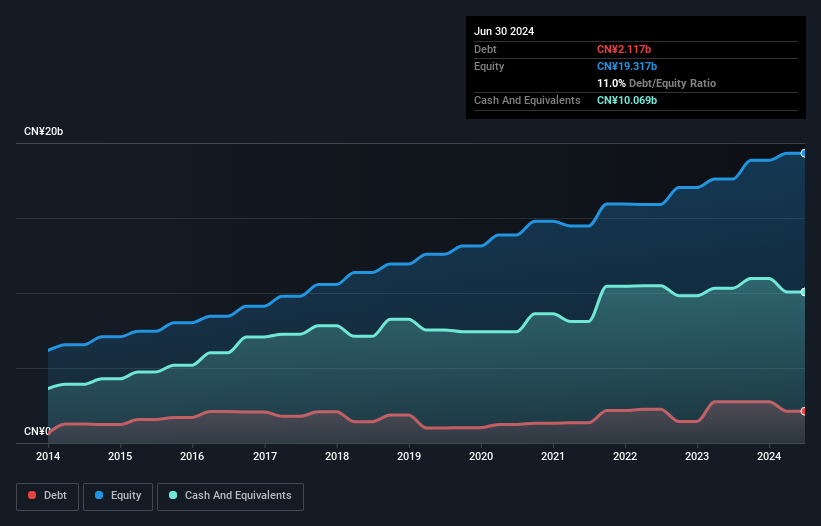Is Haitian International Holdings (HKG:1882) Using Too Much Debt?
Legendary fund manager Li Lu (who Charlie Munger backed) once said, 'The biggest investment risk is not the volatility of prices, but whether you will suffer a permanent loss of capital.' So it seems the smart money knows that debt - which is usually involved in bankruptcies - is a very important factor, when you assess how risky a company is. We can see that Haitian International Holdings Limited (HKG:1882) does use debt in its business. But the real question is whether this debt is making the company risky.
Why Does Debt Bring Risk?
Debt is a tool to help businesses grow, but if a business is incapable of paying off its lenders, then it exists at their mercy. In the worst case scenario, a company can go bankrupt if it cannot pay its creditors. While that is not too common, we often do see indebted companies permanently diluting shareholders because lenders force them to raise capital at a distressed price. Of course, plenty of companies use debt to fund growth, without any negative consequences. The first thing to do when considering how much debt a business uses is to look at its cash and debt together.
Check out our latest analysis for Haitian International Holdings
What Is Haitian International Holdings's Net Debt?
As you can see below, Haitian International Holdings had CN¥2.12b of debt at June 2024, down from CN¥2.75b a year prior. However, its balance sheet shows it holds CN¥10.1b in cash, so it actually has CN¥7.95b net cash.

How Healthy Is Haitian International Holdings' Balance Sheet?
We can see from the most recent balance sheet that Haitian International Holdings had liabilities of CN¥8.80b falling due within a year, and liabilities of CN¥2.21b due beyond that. Offsetting this, it had CN¥10.1b in cash and CN¥4.30b in receivables that were due within 12 months. So it actually has CN¥3.35b more liquid assets than total liabilities.
This surplus suggests that Haitian International Holdings has a conservative balance sheet, and could probably eliminate its debt without much difficulty. Succinctly put, Haitian International Holdings boasts net cash, so it's fair to say it does not have a heavy debt load!
Another good sign is that Haitian International Holdings has been able to increase its EBIT by 24% in twelve months, making it easier to pay down debt. When analysing debt levels, the balance sheet is the obvious place to start. But it is future earnings, more than anything, that will determine Haitian International Holdings's ability to maintain a healthy balance sheet going forward. So if you want to see what the professionals think, you might find this free report on analyst profit forecasts to be interesting.
But our final consideration is also important, because a company cannot pay debt with paper profits; it needs cold hard cash. While Haitian International Holdings has net cash on its balance sheet, it's still worth taking a look at its ability to convert earnings before interest and tax (EBIT) to free cash flow, to help us understand how quickly it is building (or eroding) that cash balance. Looking at the most recent three years, Haitian International Holdings recorded free cash flow of 36% of its EBIT, which is weaker than we'd expect. That's not great, when it comes to paying down debt.
Summing Up
While we empathize with investors who find debt concerning, you should keep in mind that Haitian International Holdings has net cash of CN¥7.95b, as well as more liquid assets than liabilities. And we liked the look of last year's 24% year-on-year EBIT growth. So we don't think Haitian International Holdings's use of debt is risky. We'd be very excited to see if Haitian International Holdings insiders have been snapping up shares. If you are too, then click on this link right now to take a (free) peek at our list of reported insider transactions.
If you're interested in investing in businesses that can grow profits without the burden of debt, then check out this free list of growing businesses that have net cash on the balance sheet.
Have feedback on this article? Concerned about the content? Get in touch with us directly. Alternatively, email editorial-team (at) simplywallst.com.
This article by Simply Wall St is general in nature. We provide commentary based on historical data and analyst forecasts only using an unbiased methodology and our articles are not intended to be financial advice. It does not constitute a recommendation to buy or sell any stock, and does not take account of your objectives, or your financial situation. We aim to bring you long-term focused analysis driven by fundamental data. Note that our analysis may not factor in the latest price-sensitive company announcements or qualitative material. Simply Wall St has no position in any stocks mentioned.
 Index Options
Index Options CME Group
CME Group Nasdaq
Nasdaq Cboe
Cboe TradingView
TradingView Wall Street Journal
Wall Street Journal